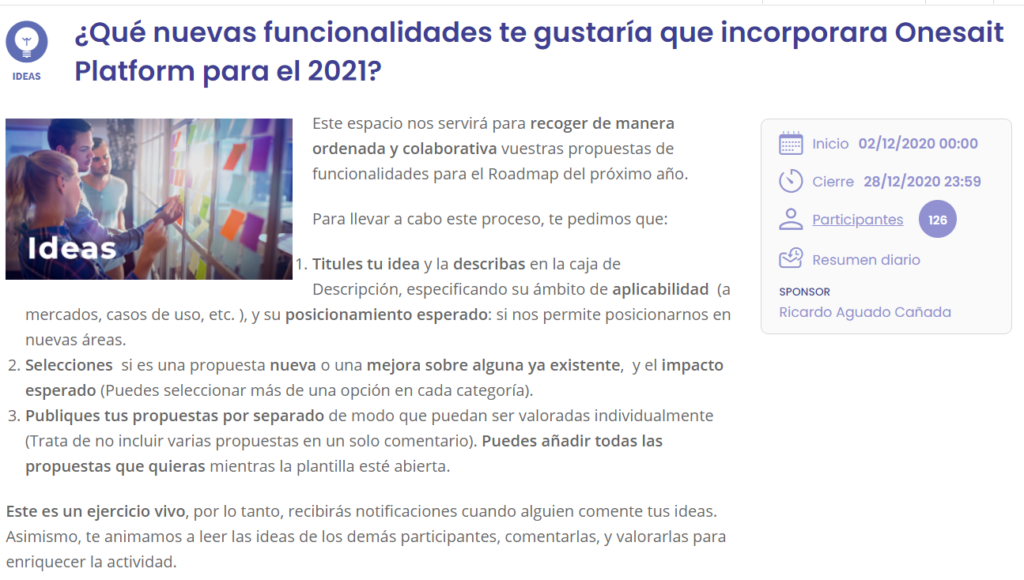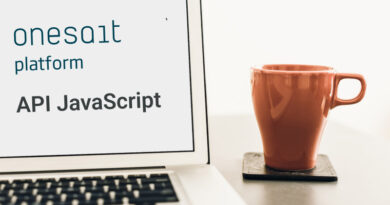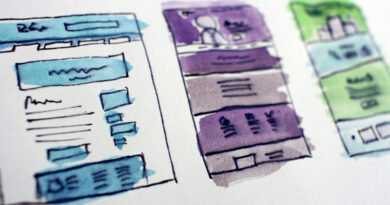2021 Roadmap ideas
Those of you who follow us on Twitter will already know what we have been saying for a few days, that we were collecting cool ideas to carry out during this 2021 and further define our Roadmap planning.
Aiming to collect proposals and suggestions for improvement in a more orderly way, this year we have used a tool called Delibera, which has allowed us a more global participation by applying Collaborative Intelligence.

With this tool we had time to think individually, but also to exchange experiences and enrich each other’s proposals.
Some of the ideas
Now that the process is over, let’s start with the analysis of these proposals.

As you can see, a total of 50 ideas have been received and 126 people have participated. We identified 28 improvements to existing modules and 24 new proposals (some were improvements or additions).
Here are some of the ones we found most interesting.
Offer JDBC Driver for access to ontologies
In this idea, Luis proposes encapsulating access to ontologies in a JDBC driver that includes Platform security (access to certain ontologies is limited depending on the user’s permissions) and proposes Apache Calcite as a technology that could be used as a starting point.
Data cross-referencing between ontologies in different databases
Luis also asks us for this improvement, and as he says:
“Currently the platform allows cross-referencing between ontologies that reside in the same database, but it would be very interesting if these could be made between ontologies that belong to different repositories, for example Mongo and a relational database, and this could be done in SQL, abstracting me from the technology underneath. There are technologies that already support this, such as Drill, SparkSQL.”
Surely this functionality would be very powerful in the Platform, especially if it could be isolated from the complexities of underlying technologies such as Spark.
Inclusion of support for several technologies
Rodrigo, from Onesait’s Architecture area, proposes analysing the incorporation of support for technologies such as:
- Service Mesh: to manage (including communication security, balancing, errors, etc.) the meshes of a large number of microservices with different technologies.
- Advanced Datagrid Service: having a DataGrid and advanced cache such as Hazelcast is key to improving performance, sharing information, etc.
- Event Broker: on top of Kafka, with Platform security.
- Microservices orchestration: with Spring Cloud Data Flow.
Most of these technologies are already used internally in the Platform:
- Hazelcast: as an internal DataGrid also provided as a basic cache service.
- Consul Service Mesh: as Service Mesh to communicate between Platform layers with HTTPS and certificates.
- Kafka: as a communication broker supported on the ontologies.
Improved user management
Several ideas coming from Pablo, Oscar and Blanca propose several improvements in user management to be able to handle user extrafields, realms, multitenant model, etc.
After several interactions with the Platform’s team and with other participants, we are already working on several of these improvements.
Support to BIM model in the Platform
José Manuel told us that the Building Information Modelling (BIM) is mandatory by law in several countries (United States, United Kingdom, Netherlands, Denmark, Finland, Norway, Sweden, etc.), and that it will soon be mandatory in Spain too.
He also mentioned that, under site management, it would be interesting to assess the possibilities of integration and/or implementation of tools that help implementing this working method and representing the information stored in this format in 3D.
In this conversation, our expert in Geographic Information Systems (GIS) Fran told Alfredo that the GIS viewer technology that we have in the Platform, CesiumJS, supports the use of BIM models, so this part of the representation is no problem at all; and he (Fran) attached an example:

Platform usage statistics
In this request, Luis Miguel commented that it would be very useful if we had usage statistics that provide arguments to market pay-per-use licenses or monetisation of services provided to customers.
Currently, certain usage statistics are already provided through the Platform metrics that are made available as ontologies and therefore can be exploited, but we will soon improve these capabilities.
Integration for IP calls, SMS sending, Whatsapp, etc.
In this proposal, Alfredo tells us that his Product generates notifications to field technicians, and that it would be interesting to integrate it with IP calls, SMS sending and Whatsapp – In other words, to achieve direct communication with field technicians on the move.
Support for the IDS (International Data Spaces) specification
José María indicates that in Innovation projects in the areas of Energy, Health and Industry, we are seeing that IDS specifications are beginning to be strongly imposed, defining the way in which information must be exchanged securely between different systems, complying with current regulations, using standards and facilitating the development of new business models based on data.
In this case, our colleague Carlos is currently analysing these specifications to see how we can support them in the Platform.
Improvements in logs
A couple of requests have been included in this sense; both César and Luis Miguel ask for distributed traceability, activation of traces with levels of detail, so that it’s easier to detect problems in productive environments.
In this case, we have already indicated that the next release will include the Centralised Logs component of the Platform based on Graylog, which will help with these issues.
Blockchain support for ontology auditing
José Manuel asks us to implement a mechanism to audit the data stored in our ontologies in a BlockChain network.
This functionality was in the past in the Sofia2 Platform, and it is surely a very interesting functionality – although nowadays it is already possible to do this through the FlowEngine, something that we use in Products for Electoral Processes.
Lineage functionality and data traceability
In this proposal, David tells us about adding data lineage and traceability functionality within the lifecycle and processing of data that may exist in products to comply with established regulatory requirements.
Adding Low Code tools to generate UI layers
Alejandro proposes incorporating tools, similar to those he has in other layers, to generate UI layers in a simple way. For example, some able to generate Vue applications from designs in Figma that would serve as a base.
As you know, our proposal is to offer a platform that guides in the use of standard technologies to use them in a common way and thus increase productivity. In this sense, we believe that it is interesting to increase the Platform’s Low-Code capabilities, and we hope to show you some news in this area soon.
Other ideas
As mentioned above, we have 50 ideas, all of them very diverse and interesting. Other proposed ideas include:
- An Excel connector to access Platform data on MongoDB.
- Incorporate all the functional and technical requirements to meet the ENS medium level.
- Integration with Justice’s Documents and Cognition services.
- MarketPlace-style gadget template repository.
- Support to MinIO + Presto as persistence engine.
- Data download from QueryTool.
- Incorporation of Key Vault in the Platform.
- Incorporate of OLAP capabilities to the Platform.
- Improvements in GIS capabilities.
- Improvements in Rules Engine.
As you can see, there are a lot of proposals for this new year, so we are not going to be idle analysing all this.
Thanks so much to those of you who have participated and shared your ideas.





